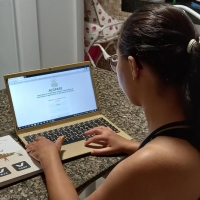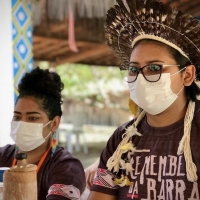News
On March 9, Brazil, Argentina and El Salvador launch a training program in Climate Resilient Agriculture
Norma Ramirez, a family farmer in the municipality of Berlín, in El Salvador, already has in mind one of the things she wants to learn in the training she will do this year on climate resilience. “I would like you to provide us with training on organic agriculture so that I have more knowledge. And also how to ensure that our crops do not lack water.” Berlin is one of the municipalities in El Salvador that is located in the Corredor Seco, a territory with a sub-humid climate that cuts through five Central American countries.

Towards the south of Latin America, more precisely in the department of Santiago del Estero, in the Chaco region, in northern Argentina, Dora Corvalán announces her expectations regarding the same training program that the Salvadoran Norma is enrolled.
“That it can create capacities in our young people, in our organizations for management, for the correct management of natural resources. That we can learn from other experiences and put this knowledge into practice, adapting it to the reality of each place, each territory", she maintains, adding that she also expects a good adhesion from young people: "I think this will take more roots if they can take ownership of this training program.

In yet another semi-arid region of Latin America, Raquel de Castro, a young woman from the Tremembé ethnic group, who lives in the indigenous lands of Barra do Mundaú, in the state of Ceará, is also motivated to participate in the training. “I want to further intensify this sustainable agroecological agriculture, which is already being worked on within the territory individually and collectively, this agriculture that only strengthens the land even more with the diversity of plantations. I believe that this training will help me even more to understand and work with the farmers in my territory”, says the young woman.

Norma, Dora and Raquel are part of the group of almost 1,300 people enrolled in the training program in Climate Resilient Agriculture, which will be launched the day after International Women's Day, this Wednesday (9), from 1 pm to 2:30 pm (Brasilia time).
The event will be broadcast via Youtube from the National Institute of Agricultural Technology (INTA), linked to the Ministry of Agriculture, Livestock and Fisheries of Argentina. INTA is the institution responsible for technological support for distance learning.
Women and climate change - Studies show that women and young people are the most vulnerable segments to the problems brought about by the increase in the planet's temperature. Historically, they are the ones who stay in the dry rural areas, when men migrate in search of work in other regions.
"The problem is not just them with the problem. It's how they are prepared to deal with the problem. Because they don't have the decision-making, they don't have the knowledge and extreme climate variations and land use are these unproductive lands. So, if she depends on her livelihood in this area, she will have to migrate to other areas. Knowledge has to be better directed to the issue of the problem. In this issue, the woman is the solution", emphasizes the Professor Humberto Barbosa, meteorologist and doctor in Soil, Water and Environmental Sciences from the University of Arizona, in the United States, who coordinated a chapter on the impact of warming on soils for one of the IPCC reports, the Intergovernmental Panel on Climate Change, which seeks to understand ongoing climate change.
The training is part of the DAKI Semiárido Vivo project, an initiative supported by two large networks of civil society organizations working in dry areas of America: Articulação Semiárido (ASA) (https://asabrasil.org.br/) and Plataforma Semiáridos (https://www.semiaridos.org/pt-br/).
DAKI's actions are supported by three organizations: in Brazil, the Associação Programa Umlhão de Cisternas (AP1MC), a legal entity that represents the ASA network. In Argentina, the Foundation for Development in Justice and Peace (Fundapaz). And, in El Salvador, the National Development Foundation (FUNDE). Financial support comes from the International Fund for Agricultural Development (IFAD), linked to the United Nations (UN).
The training program - Aimed at those who grow food in three dry regions of Latin America, the training in Climate Resilient Agriculture has as its main objective to expand the capacities of communities and rural technical assistance organizations - whether civil society or governments – to face the increasingly common adverse situations with the warming of the planet: prolonged droughts, loss of soil productivity, advance of the desertification process, storms, among others.
This training, which begins in March and runs until December of this year, is one of the responses of civil society to the climate crisis, which is already changing rainfall in areas with a history of water stress.
Territorial roots and continental reach – The training program will be carried out in the virtual environment, through internet access strategies to overcome the challenges and limits faced by those who live in the countryside to connect. At the same time, the program encourages the formation or strengthening of territorial networks that work with resilient agriculture.
“We seek to root the lessons learned not only in the participants who are directly participating in the educational sessions, but also for the people who live in these communities, in these territories, the different social actors, the reference organizations. In other words: that everyone can drink a little of the rich source that this training will be”, explains Rodica Weitzman, coordinator of the training component of the DAKI Semiárido Vivo project.
And he continues: “The idea we have is that at the end of the program we are building what we call territorial networks and, increasingly, these territorial networks are expanding, strengthening and providing sustainability to the actions planned within of action plans on climate-resilient agriculture at the territorial level.”
In addition to promoting exchanges and encouraging the formation of territorial networks around resources and knowledge that strengthen agricultural practice in the face of climate setbacks, the training program also has a great asset: the pedagogical material built from practical experiences that allow the coexistence with the semiarid.
Learn more about the training program here (https://semiaridovivo.org/1o-programa-de-formacao/)
Shifting the center of knowledge - In the pedagogical proposal of the training, the experiences carried out by the peoples of the countryside are valuable knowledge so that more and more communities and territories are prepared to face climatic extremes and develop the skills and capacities necessary to remain in the countryside with quality of life.
“As a rule, it is said that valid knowledge is systematized in the academy. DAKI is working with another form of knowledge that here, in the Brazilian semiarid region, is something very common that ASA has been working on, which is knowledge based on practice", says Antônio Barbosa, from ASA.
And he continues: "It is important to say that the practice even starts from the need that leads to innovation. So we are talking about peasant innovation, innovation of peoples to meet common, simple needs, such as access to water, soil management, forest management , handling their animals. It is this practical knowledge that farmers build, traditional communities, indigenous peoples do, that we are going to study, research, discuss with those who produce this knowledge, including with farmers, but also with technicians”.
To influence public policies - DAKI's actions favor the exchange of knowledge between peasants and technicians. These subjects are, as a rule, invisible in public debates about issues that involve them, mainly climate change. And, for IFAD, it is very important that the DAKI brings together diverse peoples from the dry areas of Latin America.
“We want this diversity, the traditional peoples and communities and various populations and segments of civil society that sometimes have no voice or have a limited voice, to be able to take concrete action and participate in the formation of public policies and of opinion formation in the climate resilience segment, which involves several dimensions and, therefore, is an important issue because it has an economic and social impact”, adds Hardi Vieira, IFAD Program Officer.
Report: Communication Office - DAKI Semiárido Vivo





